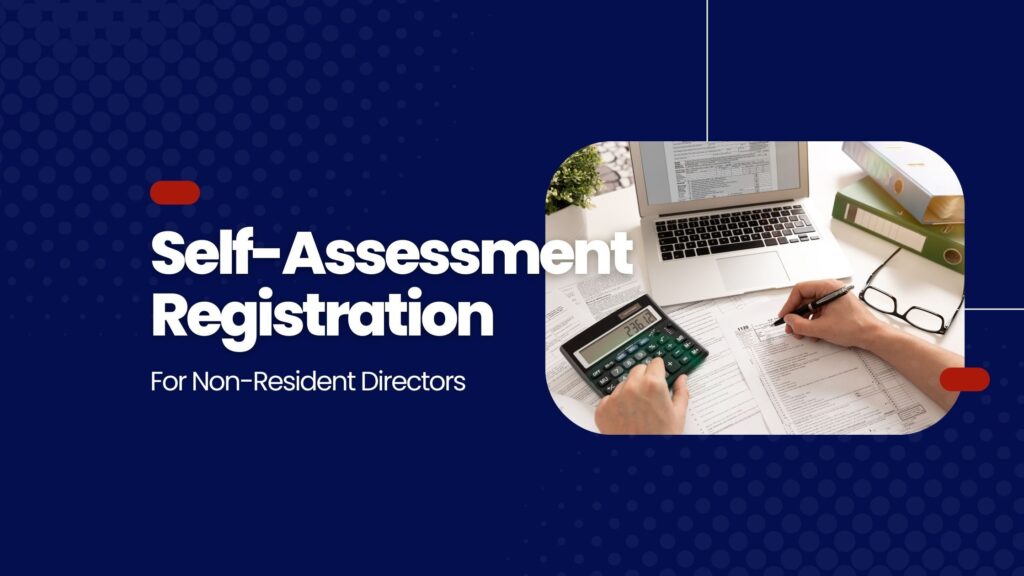Understanding tax obligations as a non-resident director of a UK company is vital to ensuring compliance and avoiding penalties. One of the most important responsibilities for non-resident directors is determining whether they need to register for the UK’s Self-Assessment tax system. In this guide, we will break down the requirements for registering, explain how to file a tax return and offer step-by-step instructions on how to stay compliant with HMRC regulations.
What is Self-Assessment for Non-Resident Directors?
Self-Assessment for Non-Resident Directors is a system used by HMRC to ensure that directors of UK companies living abroad report and pay tax on any UK income, such as director’s fees. Even if they live outside the UK, they are required to file a Self-Assessment if they receive any income from the UK. Non-resident directors may also benefit from Double Taxation Agreements, preventing them from being taxed twice on the same income in the UK and their home country. Understanding this process is crucial for staying compliant with UK tax laws.
When Do Non-Resident Directors Need to Register for Self-Assessment?
As a non-resident director, your need to register for Self-Assessment depends largely on the type of income you receive from your UK-based company.
Determining Tax Residency Status
Non-residents are typically taxed only on income arising from UK sources. HMRC uses the Statutory Residence Test (SRT) to assess your residency status. If you need clarification on your residency status, you should refer to the SRT guidelines to determine whether you are considered a UK resident for tax purposes.
Tax Obligations for Non-Resident Directors
You will generally need to register for Self-Assessment if you receive any untaxed income from your company or other UK sources. This can include dividends, interest, or reimbursement of expenses not covered by PAYE. On the other hand, if all your income is taxed through the PAYE system and you do not receive any additional untaxed earnings, you may not need to file a Self-Assessment return.
Examples of Taxable and Non-Taxable Income for Non-Residents
- Taxable Income: Dividends from shares in your company, interest payments, director’s loans, or any UK rental income.
- Non-Taxable Income: If your entire income is taxed through PAYE, or you have no untaxed income arising in the UK.
What Income is Taxable Under Self-Assessment for Non-Resident Directors?
As a non-resident director, only certain types of income from the UK are subject to UK tax. It is crucial to understand which types of income are taxable before determining whether you have to file a Self-Assessment tax return
Taxable UK Income for Non-Residents
Some common types of income that require non-resident directors to file a Self-Assessment include:
- Dividends: If you receive dividends from your company that are not covered by a UK personal allowance, you must declare them.
- Director’s Loans: Any loan or advance from your company must be declared, especially if it is not repaid promptly.
- Interest: Interest income from bank accounts or other investments in the UK should be reported.
Disregarded Income and Double Taxation Relief
If you’re a non-resident, certain UK income such as dividends or interest may be treated as disregarded income. Disregarded income must still be declared on your Self-Assessment return, but HMRC may not fully tax it. They will calculate your liability with and without this income, and you’ll only pay the lower amount. You have the option to classify this income as disregarded when completing your tax return. It’s important to also declare this income in your country of residence to comply with local tax laws and avoid penalties.
Don’t Delay Submit your Self Assessment Before The Deadline
Submit your tax return by 31 January to avoid late filing penalty. Swiftacc offers expert Self Assessment tax return services, starting at just £99.
Book an AppointmentWhatsApp UsSelf-Assessment Registration Steps for Non-Resident Directors
Automating HR processes can simplify compliance. Many HR systems track important dates like visa expirations and send reminders. They can also report changes, such as job role updates for migrant workers, to the Home Office promptly, reducing the risk of missing deadlines. Registration with HMRC is the first step toward filing a Self-Assessment tax return. Here’s a straightforward guide to the process.
Online Registration Process
HMRC has made it easier for non-residents to register online through its Government Gateway. To register:
- Set Up an Online Account: Visit the HMRC website and create an account using the Government Gateway system. You’ll need to provide your email address, confirm your identity, and create a password. After you register, you’ll receive a Unique Taxpayer Reference (UTR), which you’ll need to file your tax returns.
- Register by 5 October: You must register by 5 October following the end of the tax year in which you earned untaxed income. For instance, if you received dividends in the 2024/25 tax year, you must register by 5 October 2025.
- Receive Confirmation: HMRC will send a confirmation along with a UTR and an activation code. You will need both to access your personal tax account.
What Information Do You Need to Register?
When registering for Self-Assessment, you’ll need to provide:
- Your full name and contact details
- Your UK National Insurance number (if you have one)
- Your date of birth
- Your Unique Taxpayer Reference (if previously registered)
- The reason for registering (e.g., you are a company director receiving untaxed income)
Alternative: Registering by Post
If you cannot register online, you may complete the SA1 form and send it to HMRC by post. Be sure to print and sign the form before sending it to the designated address.
How to File a Self-Assessment Tax Return as a Non-Resident Director
Once registered, you’ll need to submit your tax return after the end of the tax year. Here’s how to complete it.
Filling Out the SA100 and SA109 Forms
- SA100: This is the main form for your Self-Assessment tax return. You’ll report your income, including any taxable dividends, interest, or other UK-based income.
- SA109: This form is specifically for non-residents and should be used to declare your non-resident status to HMRC, ensuring that your income is treated appropriately under UK law.
Key Deadlines for Filing and Payment
- 31 October: Deadline for filing paper returns.
- 31 January: Deadline for online returns and payment of any taxes owed. Be sure to mark these dates, as missing them can lead to penalties.
Understanding Penalties for Late Registration or Filing
Missing key deadlines can result in costly penalties, and it’s important to stay aware of these potential consequences.
What Happens if You Miss the Registration Deadline?
If you miss the 5 October deadline to register, HMRC may fine you and charge interest on any unpaid taxes from untaxed income. The longer you delay, the bigger the fines could be.
Penalties for Late Filing and Payment
For missing the Self-Assessment filing deadline, you could face:
- An initial £100 penalty if your return is late.
- Further penalties if the delay exceeds three months, including additional daily charges.
Double Taxation Agreements and Disregarded Income for Non-Resident Directors
The UK collaborates with other countries to ensure no one pays taxes twice on the same income through double taxation agreements. If there’s a treaty between the UK and your country of residence, you might only pay tax in one country or get a credit for taxes paid in the UK.
It is crucial to declare your UK-derived income in both the UK and your country of residence. Failing to do so could result in penalties in both jurisdictions.
Final Thoughts
Understanding your tax obligations as a non-resident director of a UK company is crucial to remaining compliant with HMRC. Whether you receive dividends, loans, or other untaxed income, registering for Self-Assessment is a straightforward process that will help you meet your obligations while avoiding penalties.
If you need help with the Self-Assessment process, our team at Swiftacc specialises in assisting non-resident directors. Book a free consultation today for expert guidance tailored to your needs and ensure you’re fully compliant with UK tax laws.
Frequently Asked Questions
Do I Need to File a Self-assessment return if I'm on PAYE?
If all your income is taxed under the PAYE system, and you do not receive any untaxed income, you may not need to file a Self-Assessment return.
What Income is Considered Untaxed?
Untaxed income includes dividends, interest, and any payments not taxed through PAYE, such as director’s loans.
How Can I Avoid Double Taxation?
You can avoid double taxation by ensuring you claim relief through the relevant double taxation treaty between the UK and your country of residence.
Can I file my Self-Assessment tax return online if I'm not based in the UK?
Yes, you are able to file your Self-Assessment tax return online from anywhere in the world through HMRC’s Government Gateway. Just ensure you meet the online filing deadline of 31 January.
Can I register for Self-Assessment if I don't have a UK National Insurance number?
Yes, you can register without a UK National Insurance number. Simply explain why you don’t have one when completing the registration, and HMRC will guide you through the process.

